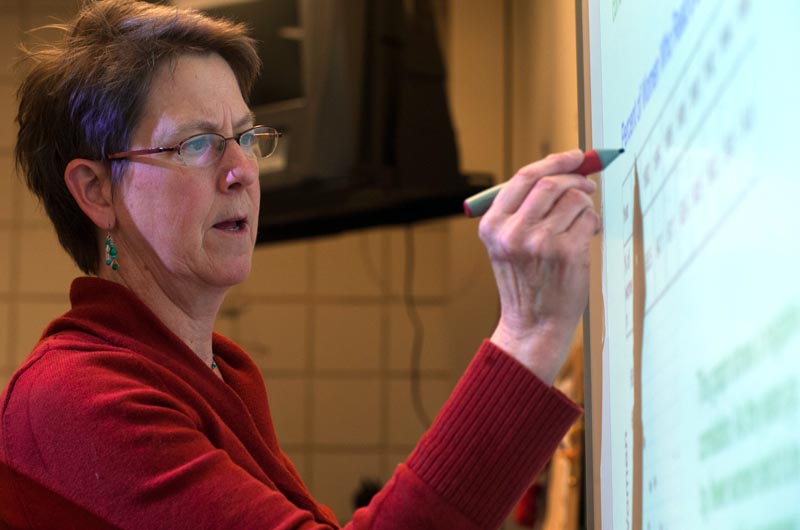The class is made up of the stuff of classes everywhere. Workbooks piled atop textbooks and notebooks, Ugg boots and sneakers swinging beneath round tables, pencils applied carefully to graph paper.
But the three girls and four boys of Linda Brown’s math class are making history here on the Island.
Armed with graphing calculators and rulers, they are the pioneers of the first year-long algebra class offered to eighth graders.
While still in middle school, they are learning the equivalent of an algebra I course at the high school level, and forging a new path for mathematics learning for students in middle school and beyond. By the end of the year, they’ll be fluent in polynomials, quadratic equations and exponents, and will take the algebra I exam.
Edgartown’s program began last year in the seventh grade as a pilot; one that every school would learn from. It’s an accelerated eighth grade algebra program that really begins the year before, when students are taught pre-algebra skills to prepare them for the eighth grade coursework.
Vineyard schools superintendent Dr. James H. Weiss has been pushing for a full-year of algebra in the eighth grade for several years.
“I really felt strongly . . . that we needed to move algebra to the middle school,” he said. “It is something done across the country, algebra is moved down to the middle school so that students can learn more math.”
Starting about eight years ago, qualified eighth graders have been offered a half-year of algebra, a class known as honors algebra.
Over the course of one academic year, the students completed one half of the high school algebra I textbook.
Ms. Brown’s class aims to complete their entire algebra textbook.
So far so good, according to principal John Stevens in a phone interview last week. “They are proceeding on schedule, according to pace; they are adapting to the pace of the program,” he said.
If the program meets success in the first year, going forward, students in Edgartown will be prepped for the accelerated sequence as early as fifth grade. But Mr. Stevens says he won’t go as far as to refer to them as separate tracks of study. Entrance to the honors level courses is fluid, and students are evaluated at least twice a year to determine their suitability for the program.
“There are entry and exit points,” he said.
The teacher, Ms. Brown, said it’s as important to offer enrichment to the minority of eighth graders who are ready to take a full year of algebra as it is to address the needs of those kids who need more help. There are 38 students in the eighth grade class at Edgartown.
“We are taking the kids that are ready for it . . . it’s not about intelligence,” she said. “It’s about being ready.”
There has been considerable debate nationally about early introduction of algebra to students in middle school, a practice that has increased in the past two decades.
Education experts often refer to algebra as the gatekeeper to higher learning because several studies have shown that access to algebra is linked with increased future educational opportunities. But some experts have argued that the term gatekeeper is misunderstood, and in fact those students who took algebra were already more motivated to attend college.
Just this week, the president of the National Council of Teachers of Mathematics published an essay titled Algebra: Not If but When, which argues that students should not be placed in algebra courses before they are ready to handle the rigor involved.
“My experience, both as a student and as a teacher, leads me to believe that we do more harm than good by placing students in a formal algebra course before they are ready, and few students are truly ready to understand the important concepts of algebra before eighth grade,” writes council president Linda Gojack in the essay. “Many students should wait until ninth grade.”
Removing a struggling student from a course where the student is not performing to standard can compromise a child’s sense of self-efficacy, she warned, so expectations should be made clear to students and parents.
Accordingly, admission to the accelerated course at Edgartown is incumbent on students scoring 90 per cent or better on a pre-algebra skills test, as well as demonstrating well-roundedness in the other courses of study. In the third quarter, Ms. Brown will decide which students to recommend to a specialized track at the high school.
Currently, successful graduates of honors algebra at each elementary school enter the accelerated mathematics track in high school, where they take three years’ worth of math in the first two years before matriculating into a pre-calculus or pre-AP calculus course in junior year. This sequence frees them up for calculus study in senior year.
The new path should afford students more flexibility, Mr. Weiss said.
“The notion is when kids get to high school they can go into either geometry or at least a higher level of algebra,” he said.
Placing directly into geometry during the first year of high school traditionally means algebra II in the second year, precalculus the next, and calculus in senior year.
The high school has not yet determined the course of study for the seven Edgartown students, but the issue will be discussed at upcoming meetings, said regional high principal Dr. Stephen Nixon.
Colleges are increasingly requiring four years of math for admission, and will often specify that the final year be a college preparatory course, like precalculus and calculus courses.
Michael McCarthy, director of guidance at the high school, says those planning to pursue study in the areas of math and science are encouraged to take higher-level courses in math, but those who do not plan to major in these areas can choose from a variety of classes, including precalculus, statistics and robotics, after they have completed the two required math classes. To graduate, students must also pass the geometry-based MCAS test.
This year, 86 per cent of the graduating class continued on to a two or four-year institution of higher learning.
Mr. Weiss said he is unsure how many schools in the state offer a full year of algebra to their eighth graders. “I think it’s still a mixed bag,” he said. “But in a lot of high performing schools, algebra is taught to eighth graders.” In some schools, a full year of algebra is split between the seventh and eighth years in order to slow the pace.
“I would say in my work with curriculum in math over last 10, 12 years, it was always that more and more schools were going into algebra at a lower level,” the superintendent said.
“The idea is that this is a pilot, a test, to see if we can gear up our program to do this. And I believe we can.”
The current full-year algebra kids, whom Ms. Brown affectionately calls her guinea pigs, are excited to be offered a new opportunity, but also a little nervous about the high school’s expectations for them, she said.
And the pilot has created a dilemma for the other Island schools — watch some Edgartown students outscore their students in algebra, or provide an enrichment opportunity for their own students.
School leaders have put their heads together and come up with a temporary fix. Select eighth graders from each school will likely be given the option of attending a summer mathematics enrichment program to catch up with Edgartown students. The program’s duration, location and other specifics have not yet been determined.
At a recent up-Island school committee meeting, Donna Lowell-Bettencourt, principal of the West Tisbury school, said she and the other down-Island principals had developed the one-year solution to keep their kids up to speed.
“As Edgartown advances with their program, we want to make sure our kids have the same opportunity,” said Richard Smith, principal in Oak Bluffs.
In West Tisbury, 10 to 15 students would be given the option of the summer course, Ms. Lowell-Bettencourt said. In Oak Bluffs, the current students already receiving a half-year of algebra already would be eligible.
It’s not the first attempt at a regional math enrichment program. When the honors algebra program started at the Oak Bluffs school eight years ago, students across the Island were bused to Oak Bluffs for instruction. Students who qualified learned algebra for half of the year.
Each school has since developed its own honors algebra program.
Now the schools are again shifting their curriculum to provide enrichment for students who are ready to learn mathematics at an even quicker pace. Ms. Lowell-Bettencourt said she is looking to hire a mathematics specialist to run the accelerated programs starting next fall. The current seventh graders at her school will be taught preliminary algebraic concepts to prepare some of them to matriculate into the year-long program, which may be implemented in all Island schools next fall.
Mr. Stevens is in regular contact with the other principals regarding the progress of the new program. “We certainly learn from what they are doing, and they offer feedback freely,” Mr. Smith said. Mr. Stevens said he’s pretty sure Edgartown will continue the program next year. “I think it’s important for us to ramp up our math program,” he said. “Most other middle schools in the country have a full year of algebra in the eighth grade, and I think it’s important to offer that same challenge for our kids; that same level of instruction.”










Comments (2)
Comments
Comment policy »